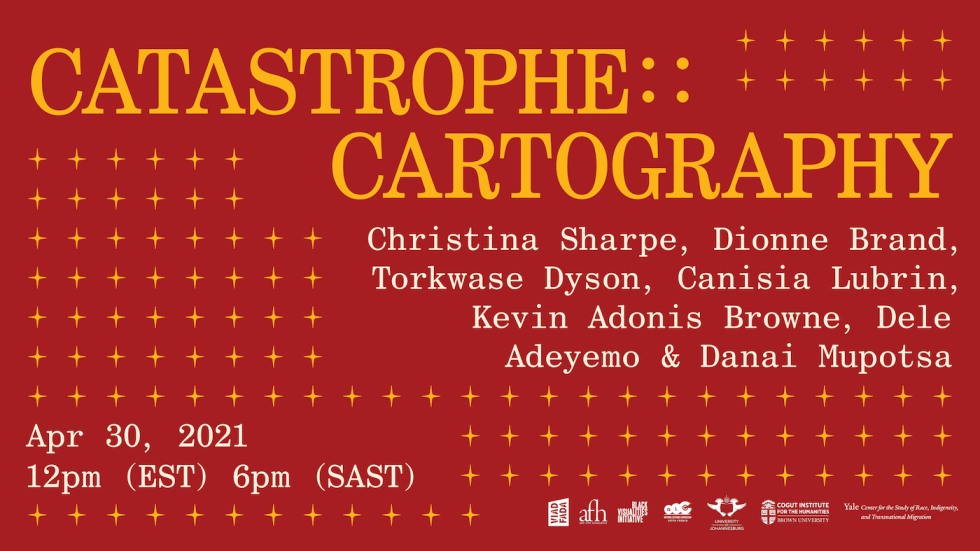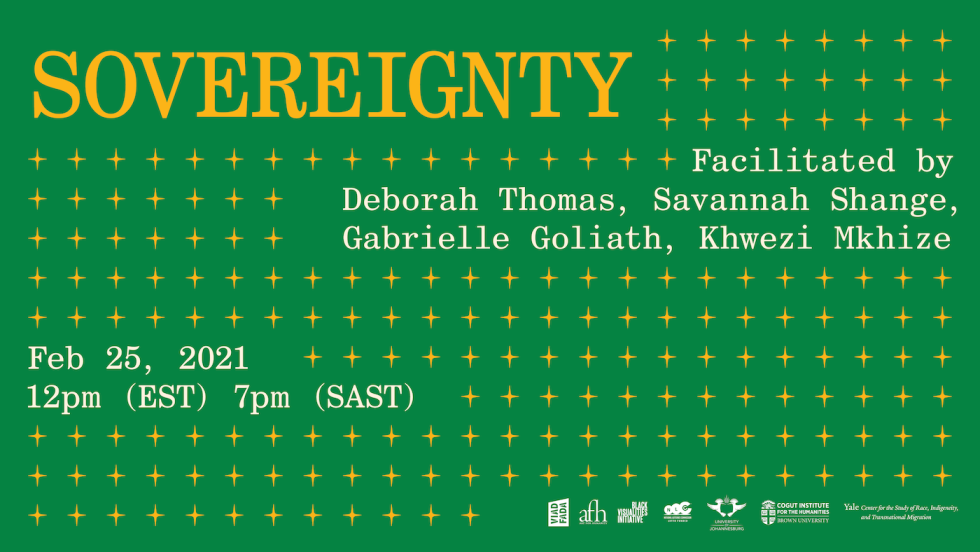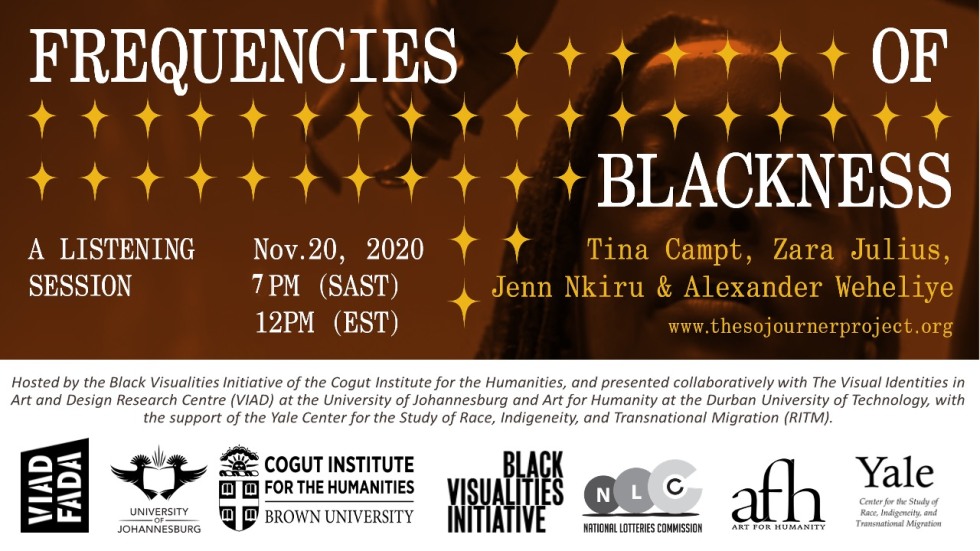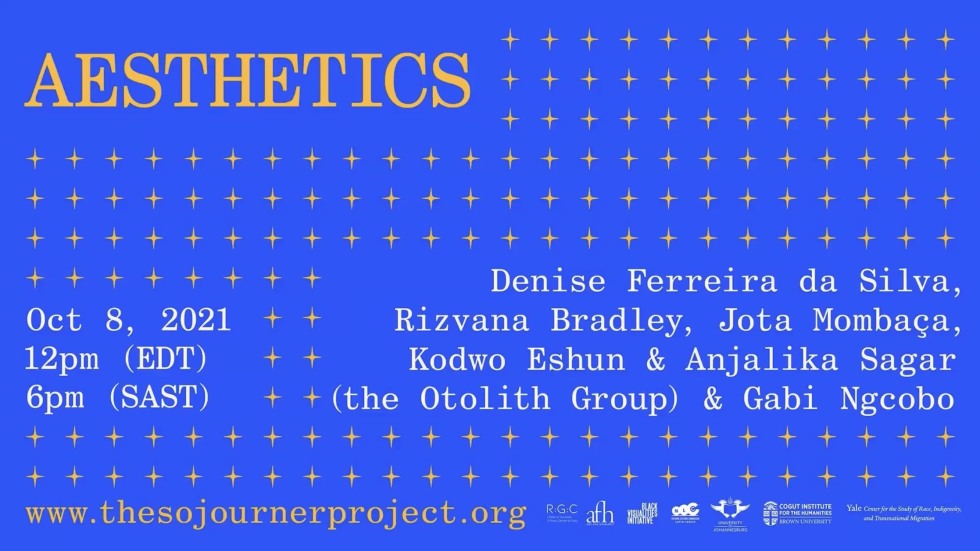The Sojourner Project is a mobile Black Studies academy initiated by the Practicing Refusal Collective, an international Black feminist forum of artists and scholars dedicated to initiating dialogues on blackness, anti-Black violence and Black futurity in the 21st century. Structured as a mobile academy that intentionally aims to exceed the literal and figurative walls of the university, the Sojourner Project convenes transnational and diasporic gatherings in which conversations, workshops, and art activations create multi-directional encounters with histories of struggle and practices of refusal that have emerged in different Black communities.
The Sojourner Project
Events
Events are presented collaboratively with the Visual Identities in Art and Design Research Centre (VIAD) at the University of Johannesburg and Art for Humanity at Durban University of Technology, with the support of the Yale Center for the Study of Race, Indigeneity, and Transnational Migration (RITM).
 Play
Play
These words mean and remember their origins in each other, each produced by the other, each is equal to the other. In the Black Atlantic, in the Black Pacific, in the Black Mediterranean, cartography is catastrophe, catastrophe is cartography. Each contributor as academics, as poets, as artists dwelt on the movement — symbolized by the double colon between these concepts. “Catastrophe::Cartography” was recorded on April 30, 2021 with Dele Adeyemo, Dionne Brand, Kevin Adonis Browne, Torkwase Dyson, Saidiya Hartman, Canisia Lubrin, Danai Mupotsa, and Christina Sharpe.
 Play
Play
Though sovereignty has become something of a disavowed category within Black Studies, it remains conceptually and materially pertinent for Black people across many locations (for those in the so-called “post”-colonial world, of course, and also for those in majority Black spaces). "Soveignty" was recorded on February 25, 2021 with Tina Campt, Deborah Thomas, Savannah Shange, Gabrielle Goliath, and Khwezi Mkhize.
 Play
Play
What does frequency offer us as a framework for understanding Black life? What insights does it provide for responding to anti-Blackness? And how might it help us to see, hear, and feel the power of Black life’s irrepressible drive toward creating a different kind of futurity? “Frequencies of Blackness: A Listening Session” was recorded on November 20, 2020 with Tina Campt, Zara Julius, Jenn Nkiru, and Alexander Weheliye.
 Play
Play
As Sylvia Wynter suggested nearly three decades ago, a radical rethinking of the category of aesthetics is a crucial, if woefully neglected, task for all of us who have been given to the refusal of modern catastrophe. This conversation between Denise Ferreira da Silva, Rizvana Bradley, Kodwo Eshun and Anjalika Sagar (of the Otolith Group), Jota Mombaça, and Gabi Ngcobo coincides with an experimental collaboration between Da Silva and Bradley, “Four Theses on Aesthetics,” published in the September issue of e-flux. Building upon Bradley’s inquiries into the racially gendered labor concealed within the putatively autonomous totality of the work of art, and upon Da Silva’s critique of the modern principles of “separability, determinacy, and sequentiality,” Da Silva and Bradley’s essay deconstructs the framework of aesthetic judgement that has predominated since Kant. Endeavoring to rethink the relationship of the aesthetic to the organization of the modern world, “Four Theses on Aesthetics” sketches the contours of an alternative theory of Blackness, aesthetics, and the work of art. This Sojourner Project session on aesthetics enters into the fray of these difficult problematics as a point of speculative departure, in the hopes of collectively contributing to the ongoing dissolution of the boundaries between philosophy, artistic experimentation, and abolitionist praxis.